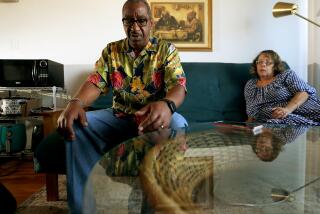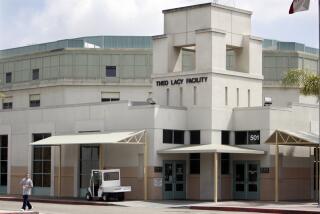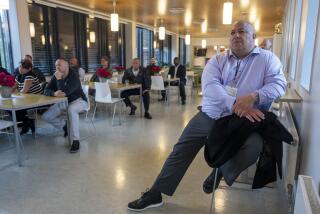Privileges for Prison Inmates
Charles (E.Z.) Williams’ lament (Commentary, March 10) over the hardship that will be imposed on prison inmates (a group to which he belongs) if the conjugal visits program is ended really broke my heart. This lament comes from a man who took it upon himself to end conjugal enjoyment forever to another by the act of murder in 1978. If prison inmates don’t wish to be put in the position of being denied the pleasure of intimacy for extended periods or a lifetime, let them think about this before they commit their crimes.
I wonder if in his anguish over the prospect of withdrawal of conjugal visits Williams has ever considered the lifetime anguish he brought to the family of his murder victim. Also, the last thing we need in an era in which the welfare state has finally been thoroughly discredited is a program guaranteed to produce welfare dependents--the offspring that result from conjugal visits.
HOWARD GOODMAN
Glendale
I just returned from a “family visit” with my husband and stepdaughter at the California Training Facility, Soledad. My stepdaughter was so excited to see her father that she called me a week before and told me she was “counting the days.” We left L.A. about 6:30 p.m. and arrived at our motel about 11:30 p.m., after a drive of some 300 miles. The next day, after we checked in with officers at the prison, presented our paperwork, luggage and enough food for three people for 2 1/2 days (all to be searched) we sat down for a three-hour wait as others arrived and were searched. My stepdaughter said, “What if I don’t recognize my dad?” She hadn’t seen him in 18 months. My heart broke at the thought that this little girl (just turned 14) wasn’t sure she would know her own father. When I tried to explain to her that we might not be able to come on any more visits she said, “That’s stupid, I want to be with my dad.” I want to be with my husband, too. Do the prisoners’ families have to be punished for loving people who are incarcerated? We are stigmatized enough.
We had a great time being a family on our visit, playing game after game of Scrabble, cooking together, doing dishes together and talking and laughing. My husband is going to be coming home in a few years. These family visits are practice at being normal for him, and all the other prisoners who participate. If they are abandoned by their families because the ties that keep them together are stripped away, where are they going to go when they are released? And how bitter, angry and desperate are they going to be? As a crime victim myself and a taxpaying, voting member of society, I would rather see these guys come out and try to rebuild their lives than return to crime. Wouldn’t you?
JULIE LAWSON
Monrovia
In “The Arts Build Bridges, Not Fences” (Commentary, March 14), artist David Beck Brown clearly explains the connection between art and the positive effects on prison inmates. If art classes in prison help redirect negative energy, we should be doing that sooner. Why wait until prison?
We should be putting our money into arts programs in every elementary, middle and high school across the nation. Think of the positive results if every child had classes and an arts mentor to guide him through an exploration of related subjects. For a fraction of the money we spend on prisons, police protection and such, we could provide each child with positive and expressive experiences in writing, painting, music, theater and dance. What a different country this would be.
RON RANSON
Leucadia


